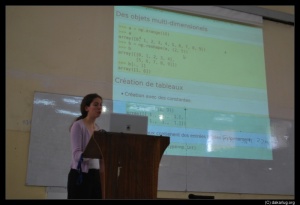While the Python African Tour (a.k.a. PAT) events are now underway, here is a wrap-up of some feedback and current thoughts about contributing through the organization of Python learning activities in Africa.
The New vs. the Old, again
When you talk to most people, you find that the Python language is underrated or new to them. C, Java, and PHP… it’s okay. But Python ?
Python could get a decent base of users in the medium to long term, if some influential guys in the university and entrepreneur spheres are aware of its advantages and decide to introduce it in their toolset or work environment.
Now, there is hope ; we’ve met guys from this new generation in Morocco, Senegal… and we are meeting others in Nigeria in a few weeks. In fact, these are the people who have been initiators and resource people in the process of organizing PAT events.

PAT Senegal team - (c) DakarLUG
User Groups
The Senegal PAT event was hosted with the help of DakarLUG, a small but very active group of people spreading the Linux and Open Source message there (install parties, demos, and all that).
Seems we were lucky… From my perception, it is hard to find active local geek or learning communities, at least in the francophone world which I am more connected to. Though this might be less true today, with the local barcamps, LUGs and Google Technology User Groups that have been launched these last two years.
Community is key to spreading Open Source ideas, practices and solutions, and if we can’t have local communities I am afraid this is going to be even more difficult.
We are helping to improve that situation ourselves, since in addition to the Python workshop, we have been organizing a camp day for a larger public, with presentations of interesting technologies and development practices.
Tools and applications, a.k.a. solutions
Ok, people want solutions… They have problems to solve.
While we want to not simply consume solutions, but be able to extend and hack around them, it helps a lot to quickly introduce interesting tools and applications (and platforms) to the people.
The current focus of PAT for this includes two domains where Python is really strong:
- Web Frameworks (Django but not limited to). In the future, we should extend this with the “client” side of things (mobile, JavaScript, HTML5…)
- Scientific tools (SciPy, NumPy)… for people coming from research departments.

PAT Senegal / Emmanuelle Gouillart presenting Scientific tools - (c) DakarLUG
Sustaining and going forward
Last but not least, we need that students having participated to the workshop become contributors. This means they need to practice after the PAT event, so they need ongoing mentoring and small projects to work on.
One trick is to convince the head of the CS/Research department we meet in the universtity or school, to introduce Python in the curriculum, or allow students to use Python for their school projects. This gave encouraging results in Dakar.
An idea I have been nurturing is running our own kind of SoC program. This is the next phase, and more details coming soon.
Contact me if you want to share more thoughts, experiences, or contribute to any aspect of this.



 Posted by Kamon Ayeva
Posted by Kamon Ayeva 

You must be logged in to post a comment.